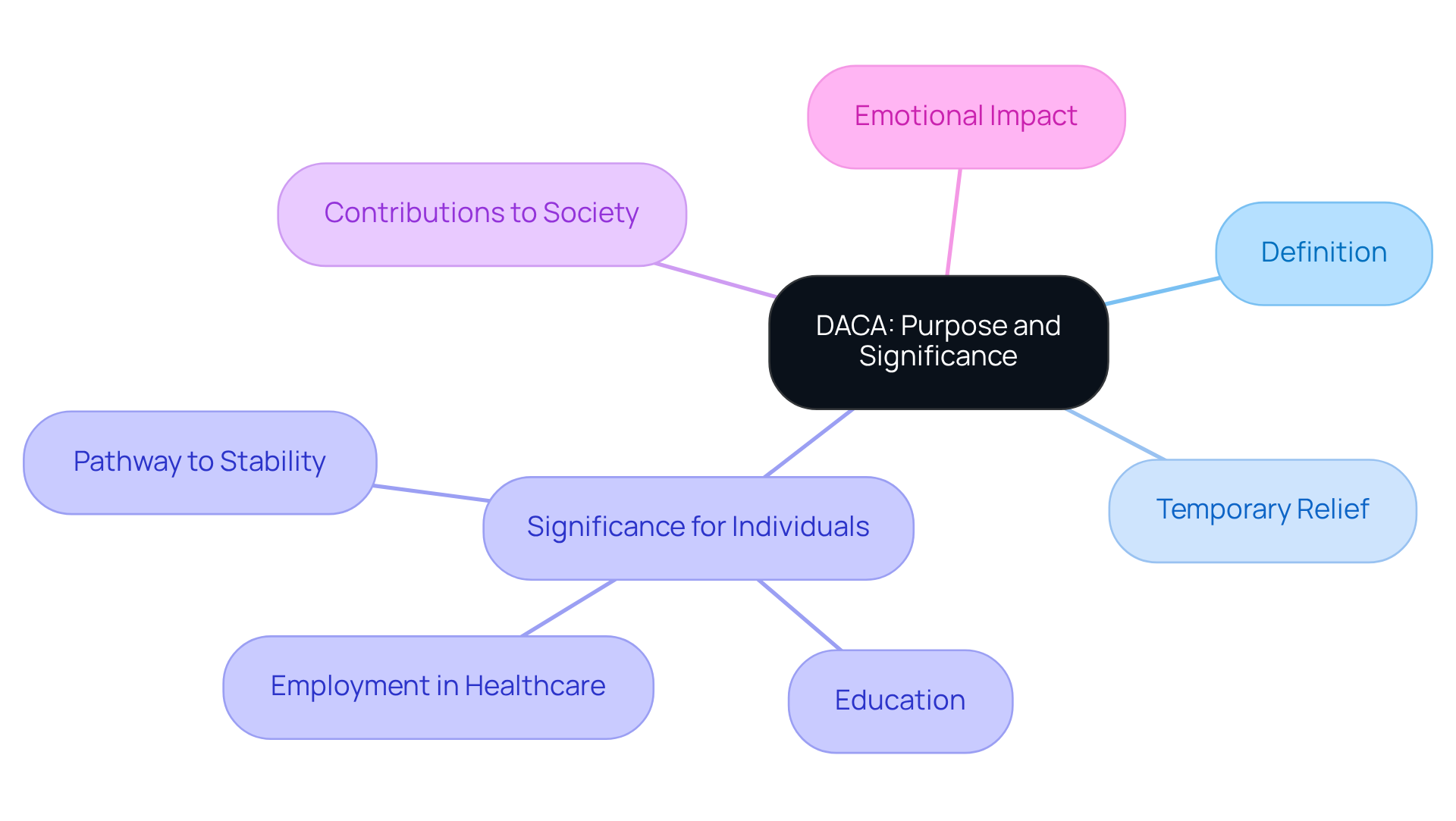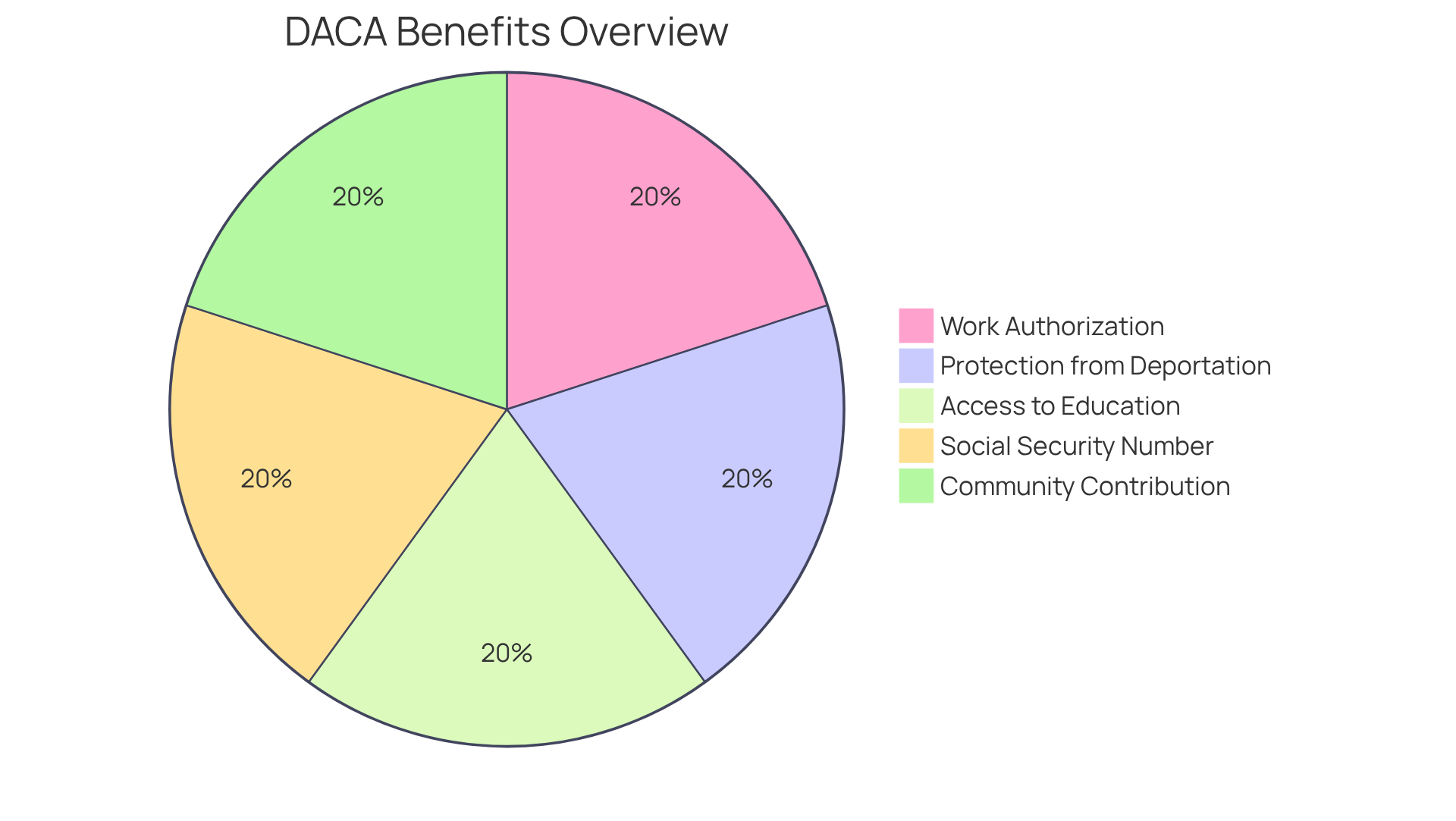Overview
The article highlights the critical requirements and significance of DACA (Deferred Action for Childhood Arrivals) for immigrant healthcare workers. This program is vital in providing stability and opportunities for those eligible, addressing the real struggles many face in navigating confusing immigration processes.
It outlines the specific eligibility criteria and benefits of DACA, such as work authorization and protection from deportation. However, it also sheds light on the ongoing legal challenges and uncertainties surrounding the program that affect recipients' long-term prospects.
We understand how overwhelming this feels, but it’s crucial to know that DACA can be a lifeline in your fight for a better future. Your rights matter, and we’re here to support you every step of the way.
Introduction
Deferred Action for Childhood Arrivals (DACA) is a vital lifeline for many undocumented immigrants who arrived in the United States as children, especially those working in healthcare. This program not only shields them from deportation but also paves the way for education and employment opportunities, allowing these individuals to make meaningful contributions to their communities.
Yet, navigating the complexities of DACA eligibility and its changing legal landscape can be daunting. How can immigrant healthcare workers face these challenges and secure their futures in a system that often feels uncertain? Understanding the nuances of DACA is crucial for those aiming to flourish in their professional paths and advocate for their rights.
We’re here to support you in this fight.
Define DACA: Purpose and Significance
Deferred Action for Childhood Arrivals (DACA) is a vital immigration policy in the United States, established in 2012. It allows certain undocumented immigrants who came to the country as children to receive a renewable two-year reprieve from deportation. This means eligible individuals can live and work in the U.S. without the constant fear of removal.
The significance of DACA lies in its provision of temporary support to those raised in the U.S., enabling them to contribute meaningfully to society, pursue education, and secure jobs—especially in critical areas like healthcare. For immigrant healthcare workers, DACA can serve as a crucial pathway to stability and opportunity in their professional journeys.
Have you ever felt lost navigating the immigration system? You’re not alone. DACA offers a beacon of hope, ensuring that those who have built their lives here can continue to do so, contributing to their communities and finding their place in the workforce.
We understand how overwhelming this can feel. Remember, you have rights, and we’re here to fight for you. Your future matters to us, and together, we can navigate these challenges. Yo Peleo — We Fight.

Outline DACA Eligibility Requirements
To be eligible for DACA, applicants must meet the following criteria:
- Age: Must have been under the age of 31 as of June 15, 2012.
- Arrival in the United States: Must have reached the United States before turning 16 years old to fulfill the DACA requirements.
- Residency: To fulfill the DACA requirements, one must have continuously lived in the United States since June 15, 2007, up to the present.
- Education: Must satisfy the DACA requirements by currently being in school, having graduated from high school, or obtained a GED. Alternatively, applicants must have been honorably discharged from the U.S. Armed Forces.
- DACA Requirements: Individuals must not have been convicted of a felony, significant misdemeanor, or three or more misdemeanors.
- Health: Must not pose a threat to national security or public safety according to DACA requirements.
Understanding the DACA requirements is crucial for medical professionals, as these criteria directly impact their ability to apply for immigration relief and the benefits that come with it. Applicants must also be aware of their rights in legal emergencies, such as receiving a subpoena or facing immigration enforcement actions. If you find yourself in such a situation, remember to exercise your right to remain silent and request an attorney immediately.
Contact Vasquez Law Firm for urgent legal assistance. Our commitment goes beyond legal representation; we also offer community education initiatives, including "Know Your Rights" workshops, to empower immigrants and support future legal professionals through scholarships and accessible legal services. We’re here to fight for your family. Your future matters to us. Yo Peleo — We Fight.

Highlight Benefits of DACA for Recipients
DACA offers several significant benefits for recipients, particularly for immigrant healthcare workers.
-
Work Authorization: Individuals covered by DACA can acquire work permits, enabling them to legally work in the U.S. This is crucial in the medical field where skilled workers are highly sought after.
-
Protection from Deportation: The program provides a temporary safeguard against removal, offering reassurance as participants advance in their careers and education.
-
Access to Education: Beneficiaries can pursue higher education opportunities, including in-state tuition rates in many states, significantly lowering the expense of obtaining a degree in medical fields.
-
Social Security Number: Those with Deferred Action for Childhood Arrivals status receive a Social Security number, essential for employment and building credit, as well as accessing financial services.
-
Community Contribution: By enabling immigrant healthcare professionals to practice legally, this program enhances the health and well-being of communities, especially during public health emergencies.
These advantages highlight the significance of the program for individuals who meet the DACA requirements, allowing them to succeed in their selected professions.

Discuss Current Legal Status and Challenges of DACA
The legal status of the program is a topic of ongoing debate and litigation, creating uncertainty for recipients. Currently, the program remains in place, but its future is uncertain due to various court challenges and legislative efforts aimed at either rescinding or solidifying it. Here are some key challenges:
- Legal Challenges: Several states have initiated legal actions against the program, arguing that it is unconstitutional. These legal battles can lead to changes in the program's availability and DACA requirements.
- Political Climate: The political landscape significantly influences the program's future, with varying levels of support from different administrations. Changes in management can result in modifications in policy that impact individuals covered by deferred action.
- Renewal Process: Individuals protected under the program must renew their status every two years, which can be a source of anxiety, especially with the potential for policy changes.
- Limited Path to Permanent Residency: DACA does not provide a direct path to citizenship or permanent residency, leaving recipients in a state of limbo regarding their long-term status.
For immigrant healthcare workers, staying informed about these challenges is essential for making informed decisions about their immigration status and career paths. Remember, you are not alone in this fight.

Conclusion
DACA serves as a crucial lifeline for immigrant healthcare workers, allowing them to live and work in the United States without the constant fear of deportation. This program provides a temporary reprieve from removal, fostering stability and enabling these individuals to make significant contributions to the healthcare sector, ultimately enhancing the well-being of our communities.
The article underscores essential eligibility requirements for DACA, such as age, residency, education, and legal conduct. It highlights the numerous benefits of the program, including work authorization, access to education, and protection from deportation. Moreover, it addresses the current legal challenges facing DACA, emphasizing the importance of staying informed and proactive in navigating these uncertainties.
DACA's significance extends beyond individual benefits; it plays a pivotal role in the healthcare workforce, ensuring that skilled professionals can continue to serve their communities effectively. As the landscape surrounding DACA evolves, it is vital for recipients and potential applicants to remain updated on legal developments and advocate for their rights. Empowerment through knowledge and community support is essential in this ongoing journey, reinforcing the message that every individual’s future truly matters.
We’re here to fight for your family. Your future matters to us. Yo Peleo — We Fight.
Frequently Asked Questions
What is DACA?
DACA stands for Deferred Action for Childhood Arrivals, an immigration policy established in 2012 that allows certain undocumented immigrants who arrived in the U.S. as children to receive a renewable two-year reprieve from deportation.
Who is eligible for DACA?
DACA is designed for undocumented immigrants who came to the U.S. as children and meet specific criteria set by the policy.
What benefits does DACA provide?
DACA allows eligible individuals to live and work in the U.S. without the constant fear of deportation, enabling them to contribute to society, pursue education, and secure employment, particularly in essential fields like healthcare.
Why is DACA significant?
DACA is significant because it provides temporary support to individuals raised in the U.S., allowing them to stabilize their lives, contribute to their communities, and find opportunities in the workforce.
How does DACA impact immigrant healthcare workers?
For immigrant healthcare workers, DACA can serve as a crucial pathway to stability and opportunity in their professional journeys, allowing them to work legally and contribute to the healthcare system.
What message does the article convey about navigating the immigration system?
The article acknowledges the overwhelming nature of navigating the immigration system and emphasizes that individuals have rights and support available to help them through these challenges.




